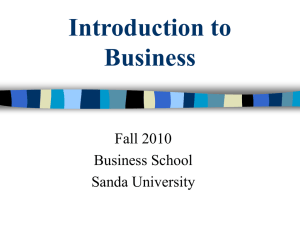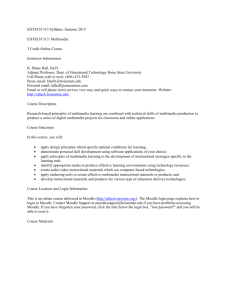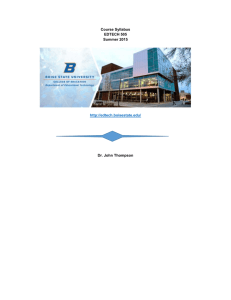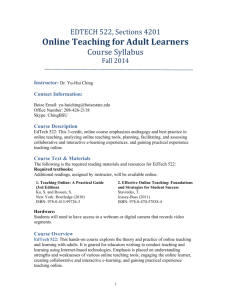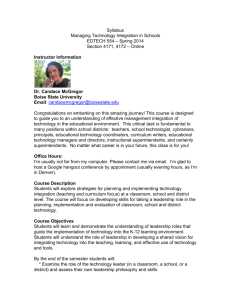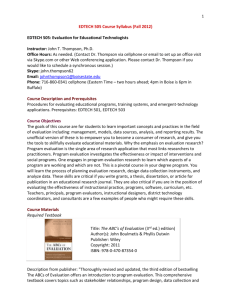EDTECH 672-Syllabus-SP15-Ching
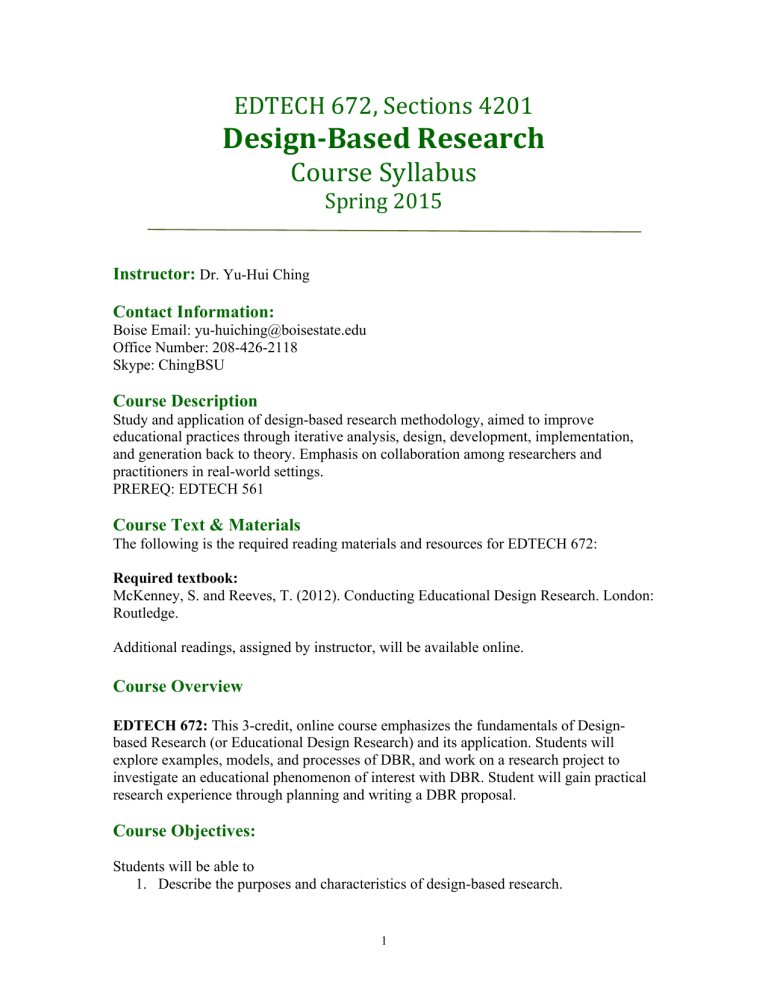
EDTECH 672, Sections 4201
Design-‐Based Research
Course Syllabus
Spring 2015
Instructor:
Dr. Yu-Hui Ching
Contact Information:
Boise Email: yu-huiching@boisestate.edu
Office Number: 208-426-2118
Skype: ChingBSU
Course Description
Study and application of design-based research methodology, aimed to improve educational practices through iterative analysis, design, development, implementation, and generation back to theory. Emphasis on collaboration among researchers and practitioners in real-world settings.
PREREQ: EDTECH 561
Course Text & Materials
The following is the required reading materials and resources for EDTECH 672:
Required textbook:
McKenney, S. and Reeves, T. (2012). Conducting Educational Design Research. London:
Routledge.
Additional readings, assigned by instructor, will be available online.
Course Overview
EDTECH 672: This 3-credit, online course emphasizes the fundamentals of Designbased Research (or Educational Design Research) and its application. Students will explore examples, models, and processes of DBR, and work on a research project to investigate an educational phenomenon of interest with DBR. Student will gain practical research experience through planning and writing a DBR proposal.
Course Objectives:
Students will be able to
1.
Describe the purposes and characteristics of design-based research.
1
2.
Analyze DBR examples on their contexts, processes, and outputs.
3.
Investigate literature describing and evidencing design research.
4.
Identify specific educational related phenomena to explore through design research cycles.
5.
Apply field-based investigation methods to gather information and interpret a research setting to outline the implications for design.
6.
Synthesize literature to explore an educational problem and identify the gap(s) in the literature.
7.
Plan a design-based research to investigate an educational related phenomenon.
8.
Offer constructive feedback on peers’ work and incorporate feedback into one’s own work.
Major Assignments*
1.
Module discussions (20%) – Each student is expected to participate in the
Module discussions actively.
2.
Reflective Journals (10%) – Each student will keep a reflective journal (using a blog or Google Doc) on their evolving understanding of DBR and the progress of their research project.
3.
Presentation of two design research examples (10%) - Each student will review two design research examples and complete a written report and a
VoiceThread presentation of their reviews.
4.
Literature review (20%) - Each student will thoroughly investigate an educational phenomenon/problem of interest by examining related literature, and identify gaps in the literature to ground their own potential design research study.
5.
Research Proposal (30%) – Each student will write a research proposal articulating an iterative design research study related to an identified phenomenon and intervention.
6.
Peer Review on Literature Review and Research Proposal (10%) – Each student will read at least two other students’ literature reviews and research proposals to make suggestions and comments for improvement. Students are expected to benefit from multiple perspectives on the potential implementation of a design research study.
*I reserve the right to adjust the assignments and point allocations as necessary.
2
Course Grades
Your final grade is calculated as follows:
Assignments:
Module Discussion Participation (5 @ 40 pts. each)
Reflective Journal (4 @ 25pts. each)
Presentation of Two EDR Examples
Literature Review
Research Proposal
Possible
Points
200
100
100
200
300
100
Grading Scale
A+ = 980 to 1000
A = 930 to 979
A- = 900 to 929
B+ = 880 to 899
B = 840 to 879
B- = 800 to 839
C+ = 780 to 799
C = 740 to 779
C - = 700 to 739
D =600 to 699
F Below 600
Peer Review for Literature Review and
Research Proposal
Total Possible Points: 1000
Teaching/Learning Methodology
EDTECH 672 utilizes an active and collaborative teaching/learning methodology. Active learning occurs when students take a deliberate and participatory role in the course
(Kane, 2004). In an active learning environment, the instructor serves as a facilitator instead of encouraging a traditional lecture environment. Student success in this course is highly dependent on the participation of all students in online discussions via Moodle and completion of assignments.
Kane, L. (2004). Educators, learners and active learning methodologies. International
Journal of Lifelong Education, 23 (3), 275-286. doi:10.1080/0260/37042000229237.
Course Policies and Guidelines
Time Management: Be aware that the university “recommends that you plan on 3-4 hours of course work per credit per week for Distance Ed classes.” This means approximately 9 to 12 hours per week for a regular semester.
Assignment Policy -- Assignments are due by 11:55 pm Mountain Standard Time (MST).
Assignments are due on the date indicated in the syllabus or course schedule. It is the student’s responsibility , in the event of an emergency, to contact faculty prior to the due date to discuss the options for completing assignments. All assignments and communication must include the student’s name, faculty name and the course number. It
3
is the student’s responsibility to keep a copy of all submitted assignments. Late assignments may be reduced in grade by 10% for every day they are late. Please note that succeeding academically in graduate school requires ALL required work to be submitted to faculty in a timely fashion.
Special Circumstances – please let me know of any events/circumstances that may affect your ability to submit an assignment on time prior to the due date.
Remember: Always save a copy of your assignment on your hard drive!
Attendance Policy-- Students will work through five online learning modules during this course. Active participation in all of these components will be required in order to pass the course. This course will be delivered through the web-based system called Moodle.
Moodle is a Web-based course-management system designed to allow students and faculty to participate in classes delivered online. Moodle can be accessed on-campus or off-campus via a computer with Internet access.
Moodle Log-in: http://edtech.mrooms.org/
Procedures – Follow the instructions contained in each module. There are five modules located in the Moodle course area.
Communication – Department policy - instructors will respond to emails and/or phone calls in a timely manner – usually within 24 hours (weekdays, but may be longer on a weekend or with advance notice to students).
Posting of Assignments – Department policy- major assignments will be posted at least one week in advance of the assignment due date. (Note: I will open all the modules up at
the beginning of the course).
Reasonable Accommodations Any student who feels s/he may need accommodations based on the impact of a disability should contact me privately to discuss your specific needs. You will also need to contact the Disability Resource Center at 208-426-1583 located in the Lincoln Garage to meet with a specialist and coordinate reasonable accommodations for any documented disability.
Statement on Academic Integrity and Conduct - Assignments you submit must be your original work and cannot be used in other courses in the EDTECH program without specific permission from the teachers. Nor can you use significant portions of assignments completed for another course in this course. All work that you submit must show your own ideas and current understanding. Assignments you submit must be original and developed by you. You are welcome to get ideas from other sources.
However, you must adapt such ideas to support the point you are trying to make and cite your sources, even though they are paraphrased. Anything copied from another source must be indicated by quotation notations. Students must abide by the BSU Student Code of Conduct regarding Academic Dishonesty (refer to the Boise State University Student
4
Handbook). The Boise State University Student Code of Conduct and policies on
Academic Dishonesty are located at the following websites. We encourage you to read these carefully. Students will be held to these standards in all areas of academic performance. http://www.boisestate.edu/osrr/scp/student_code.html
Net Etiquette— Discussion via Moodle is closed to anyone not enrolled in this course.
All communication between students and faculty should remain professional and courteous. This is true of both Moodle and email communications. Language and grammar matters so be careful on how you phrase your communication. Simplicity and directness are helpful in getting your message across (directness does not mean rudeness or angry responses to either students or faculty). It is possible to receive a failing grade
('F') for the Class Participation portion of the course if rude and unseemly communications via Moodle and email become an issue and are not corrected. The following is a link on Net Etiquette: http://www.albion.com/netiquette/corerules.html
ADA Information— Any student needing information on American Disabilities Act
(ADA) services at the university should contact the Boise State University Disability
Resource Center at 208-426-1583 or DRCinfo@boisestate.edu. You can also access information on the BSU web page: http://drc.boisestate.edu/
Copyright Statement-- Some of the materials in this course may be copyrighted. They are intended for use only by students registered and enrolled in this course and only for instructional activities associated with and for the duration of the course. They may not be retained in another medium or disseminated further. They are provided in compliance with the provisions of the Teach Act.
Boise State University Statement of Shared Values
In addition to the policies governing academic integrity, Boise State University has adopted a Statement of Shared Values. In a culture of intellectual inquiry and debate, where the search for knowledge and discovery flourish, campus community members are expected to demonstrate civility, abide by norms of decorum, and adhere to the principles of civil discourse. Civility is expressed in the Statement of Shared Values, which includes
Academic Excellence, Caring, Citizenship, Fairness, Respect, Responsibility, and
Trustworthiness. We encourage you to read these statements carefully, and consider them when interacting with faculty, fellow students, and members of the community: http://president.boisestate.edu/values/statement-of-shared-values/
Course Behavioral Norms and Professional Expectations
Faculty members in higher education have a unique responsibility to encourage debate and to promote intellectual inquiry. To do so, we must bring civility to discourse and respect to our conversations and encounters. Fostering a classroom environment
5
conducive to student learning and evocative dialogue is critical. Therefore, co-creating classroom and clinical norms on the first day of class is essential in fostering a civil environment. This process instills in students a sense of ownership and commitment to a respectful academic environment. When norms are created and implemented, students and faculty are more likely to abide by them. A critical component of successful learning is the mutual respect and the expectation for success that both teachers and students bring to their interactions, whether in a face-to-face or distance setting. As your instructor, I commit to creating a professional and respectful atmosphere in this course, where people may share experiences and ask questions in a safe and supportive environment. It is my expectation that we will follow similar norms in the classroom, with other students and faculty within our school, and in our interactions outside the course setting. Civil, respectful behavior is equally as important in our communications away from the real or virtual classroom, whether in a face-to-face discussion, an email, a voicemail, or on a social networking site. By setting norms and treating each other with respect and courtesy, we model the role of a professional educator.
AECT Standards (2012 Version) Addressed in this Course:
AECT Standard 5 (Research): Candidates explore, evaluate, synthesize, and apply methods of inquiry to enhance learning (p. 4) and improve performance (pp. 6-7).
Indicators:
•
5.1 Theoretical Foundations - Candidates demonstrate foundational knowledge of the contribution of research to the past and current theory of educational communications and technology. (p. 242)
• 5.2 Method - Candidates apply research methodologies to solve problems and enhance practice. (p. 243)
•
5.3 Assessing/Evaluating - Candidates apply formal inquiry strategies in assessing and evaluating processes and resources for learning and performance. (p. 203)
6


